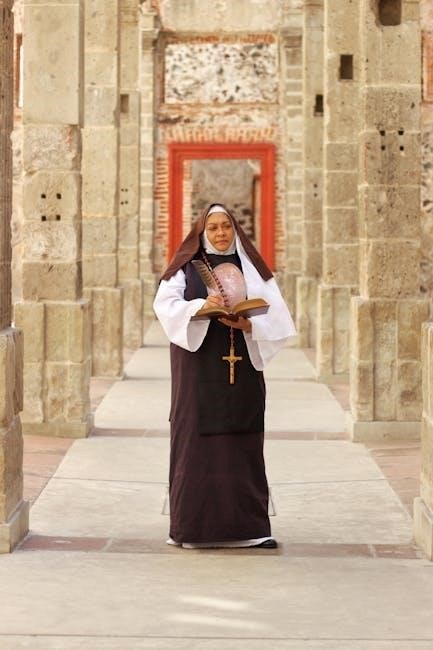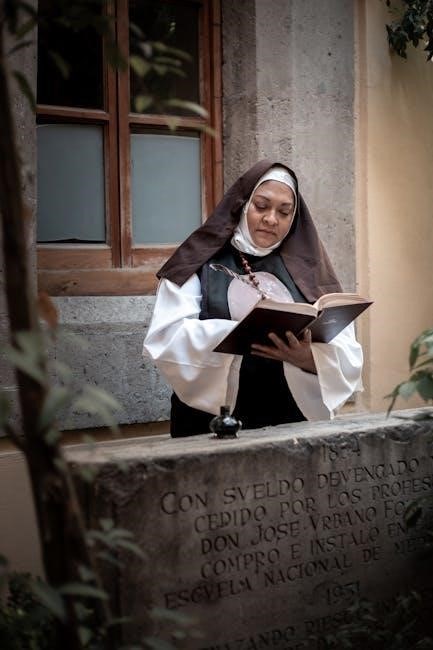The Order of Christian Initiation of Adults (OCIA) is a restored process from the Second Vatican Council, guiding adults into the Catholic Church through faith formation and sacraments.
1.1 Overview of the OCIA Process
The Order of Christian Initiation of Adults (OCIA) is a structured process designed to guide unbaptized adults and baptized Christians into full communion with the Catholic Church. It integrates liturgical, catechetical, and community dimensions, ensuring a holistic formation. The process includes periods of inquiry, catechumenate, purification, and mystagogia, culminating in the reception of the sacraments of Baptism, Confirmation, and the Eucharist. This journey is supported by the parish community, pastors, and catechists, emphasizing spiritual growth and preparation for a life of faith. The OCIA process reflects the Church’s commitment to evangelization and the integration of new members into its life.
1.2 Historical Context and Significance
The Order of Christian Initiation of Adults (OCIA) traces its roots to the early Church’s cateumenate, a process for initiating new members into the faith. Restored by the Second Vatican Council in 1972, OCIA was originally known as the Rite of Christian Initiation of Adults (RCIA). In 2021, the name was officially changed to OCIA to emphasize the liturgical and communal nature of the process. This restoration reflects the Church’s renewed focus on evangelization and its commitment to providing a structured, sacramental journey for adults seeking full communion with the Catholic Church.

Structure of the OCIA Process
The OCIA process is a structured journey for adults seeking full communion with the Catholic Church, integrating liturgical and catechetical elements to foster spiritual growth and conversion.
2.1 Periods of the Initiation Journey
The OCIA process includes distinct periods: Precatechumenate (initial inquiry), Catechumenate (faith formation), Purification and Enlightenment (spiritual preparation), and Mystagogia (post-baptismal reflection). These periods guide adults through conversion, sacramental preparation, and integration into the Church community, ensuring a holistic journey of faith; The process is tailored to individual needs, fostering spiritual growth and understanding of Catholic teachings. This structured approach reflects the Church’s commitment to nurturing adults as they embrace their Christian identity.
2.2 Steps and Stages of Christian Initiation
The OCIA process includes key steps and stages that guide adults toward full initiation into the Catholic Church. The journey begins with the Rite of Acceptance, where individuals publicly declare their intent to follow Christ; This is followed by the Rite of Election, marking their commitment to the sacraments. The Sacraments of Initiation—Baptism, Confirmation, and Eucharist—are typically received during the Easter Vigil. These steps are integral to the transformative journey, ensuring a profound encounter with Christ and integration into the Church community. Each stage is rooted in prayer, reflection, and spiritual preparation, fostering a deep understanding of Catholic faith and practice.

Sacraments of Christian Initiation
The sacraments of Baptism, Confirmation, and the Eucharist are central to the OCIA process, initiating adults into the Catholic Church through these essential rites.
3.1 Baptism: The Sacrament of Birth in the Church
Baptism is the first sacrament of initiation, symbolizing spiritual rebirth and welcoming individuals into the Church. Through water and the invocation of the Trinity, sins are forgiven, and the person becomes a child of God. It is a fundamental step for catechumens, marking their entry into the Christian community. Baptism is typically celebrated during the Easter Vigil, emphasizing resurrection and new life in Christ. This sacrament is essential for full initiation and participation in the Eucharist and Confirmation.
3.2 Confirmation: The Sacrament of Strength and Mission
Confirmation is the sacrament that strengthens and deepens the grace of Baptism, empowering individuals to live as witnesses of Christ. Administered by a bishop, it involves the anointing with holy chrism and the laying on of hands. This sacrament seals the Holy Spirit within the person, enhancing their commitment to faith and mission. For adults in the OCIA process, Confirmation completes their initiation and prepares them for active participation in the Church’s life and evangelization. It is often celebrated alongside Baptism and the Eucharist, fulfilling their initiation into the Catholic Church.
3.3 Eucharist: The Sacrament of Spiritual Nourishment
The Eucharist is the source and summit of Christian life, established by Christ at the Last Supper. It is both a sacrifice and a meal, where believers receive the Body and Blood of Christ, deepening their union with Him and the Church. For adults in the OCIA process, the Eucharist is the culmination of their initiation, completing their sacramental journey. Through this sacrament, they are spiritually nourished, strengthened, and united with the faithful. The Eucharist fosters a deeper relationship with God and equips individuals to live as disciples, actively participating in the Church’s mission and worship.

Participants in the OCIA Process
The OCIA process involves two main groups: catechumens, who are unbaptized adults seeking full initiation, and candidates, baptized adults completing their sacraments of initiation.
4.1 Catechumens: Unbaptized Adults Seeking Initiation
Catechumens are unbaptized adults who seek to join the Catholic Church through the OCIA process. They enter the catechumenate, a period of formation and discernment, guided by the Church. This journey includes prayer, study of Sacred Scripture, and doctrinal instruction. Catechumens participate in rites such as the Rite of Acceptance and the Rite of Election, marking their progress toward initiation. They are supported by sponsors and the parish community as they prepare to receive the sacraments of Baptism, Confirmation, and Eucharist at the Easter Vigil, fully entering into the life of the Church.
4.2 Candidates: Baptized Adults Completing Initiation
Candidates are baptized adults, either in the Catholic Church or another Christian tradition, who seek to complete their Christian initiation. They typically need Confirmation and/or the Eucharist. Unlike catechumens, candidates are already baptized, so their journey is shorter and focuses on doctrinal formation and spiritual preparation. They participate in sessions that deepen their faith and understanding of Catholic teachings. This process culminates in the reception of the remaining sacraments, often at the Easter Vigil. Candidates are supported by the parish community and sponsors, ensuring they are well-prepared to fully participate in the life of the Church.

The Role of the Church Community
The Church community plays a vital role in OCIA by providing support, guidance, and hospitality to participants. Through prayer and witness, it aids their spiritual journey and integration into the faith.
5.1 The Parish and Its Ministry in OCIA
The parish plays a central role in the OCIA process by creating a supportive and prayerful environment for participants. It provides liturgical celebrations, catechetical sessions, and pastoral care tailored to the needs of catechumens and candidates. The parish community, through its witness and hospitality, helps integrate newcomers into the life of the Church. Pastors and catechists collaborate to ensure a comprehensive and transformative journey. The parish also adapts the rite for baptized adults seeking full initiation, ensuring their spiritual growth aligns with the Church’s teachings and traditions, fostering a deeper connection to the faith community.
5.2 The Role of Pastors and Catechists
Pastors and catechists play a crucial role in the OCIA process, providing spiritual guidance and instruction to catechumens and candidates; Pastors collaborate with bishops in overseeing the initiation process, ensuring the faithful transmission of Catholic doctrine. Catechists are responsible for delivering comprehensive catechetical formation, rooted in Sacred Scripture and Church teachings. Together, they adapt the rite to meet the needs of participants, whether unbaptized adults or baptized Christians seeking full communion. Their ministry involves fostering a deep understanding of the faith, preparing individuals for the sacraments, and supporting their spiritual growth throughout the initiation journey.

Recent Developments and Changes
In 2021, the U.S. Conference of Catholic Bishops renamed the Rite of Christian Initiation of Adults (RCIA) to the Order of Christian Initiation of Adults (OCIA), reflecting its liturgical and catechetical significance.

6.1 Transition from RCIA to OCIA in 2021
In 2021, the U.S. Conference of Catholic Bishops officially transitioned from the Rite of Christian Initiation of Adults (RCIA) to the Order of Christian Initiation of Adults (OCIA). This change aimed to emphasize the liturgical and catechetical dimensions of the process, ensuring a more integrated approach to adult initiation. The OCIA retains the same core structure and stages as RCIA but shifts focus to the liturgical and communal aspects, aligning it more closely with the Church’s mission and liturgical practices.

6.2 Implications of the Name Change
The transition from RCIA to OCIA in 2021 reflects a renewed emphasis on the liturgical and catechetical dimensions of adult initiation. The term “Order” highlights the structured, communal nature of the process, aligning it more closely with the Church’s liturgical practices and its mission of evangelization. This change underscores the importance of integrating faith formation with the liturgical year and the role of the parish community. It also signals a shift toward a more inclusive and structured approach to initiating adults into the Catholic Church, emphasizing the transformative journey of faith and the Church’s commitment to supporting those seeking full communion.

The Liturgical and Catechetical Dimensions
The OCIA integrates liturgical and catechetical dimensions, aligning the initiation journey with the liturgical year and Sacred Scripture, enriching faith formation through shared rituals and teachings.
7.1 Integration with the Liturgical Year
The OCIA process is deeply integrated with the liturgical year, aligning the journey of faith with the Church’s seasonal celebrations. This integration allows catechumens and candidates to experience the richness of the liturgical cycle, fostering a profound connection to the mysteries of Christ. The rites and rituals are adapted to the liturgical seasons, ensuring a cohesive and meaningful progression. This communal celebration strengthens the participants’ understanding of the Church’s liturgy and doctrine, while the liturgical year provides a sacred framework for their spiritual transformation and initiation into the Catholic faith.
7.2 The Importance of Sacred Scripture
Sacred Scripture is central to the OCIA process, serving as the foundation for catechetical instruction and spiritual growth. The proclamation of the Word of God inspires and transforms participants, drawing them into the life of Christ. Through Scripture, adults encounter the divine revelation, fostering a deeper understanding of Catholic doctrine and the mysteries of faith. The liturgical and catechetical dimensions of OCIA are rooted in Scripture, which enlightens the minds and hearts of those journeying toward initiation. This emphasis on Sacred Scripture ensures that the process is firmly grounded in the Church’s tradition and the teachings of Christ.
The OCIA is a transformative journey for adults seeking full communion with the Catholic Church, emphasizing faith, sacraments, and community, fulfilling the Church’s mission of evangelization.
8.1 The Transformative Journey of OCIA
The OCIA journey is a profound spiritual transformation for adults, guiding them from initial curiosity to full communion with the Catholic Church. Through scripture, liturgy, and community support, participants deepen their faith and encounter Christ. The process fosters personal conversion, equipping individuals to live as disciples. It is a path marked by prayer, reflection, and sacramental milestones, leading to a life of service and witness. This journey not only enriches the individual but also strengthens the Church, as new members bring fresh perspectives and enthusiasm to the faith community.
8.2 The Church’s Mission in Evangelization
The Church’s mission in evangelization is central to the OCIA process, as it calls Catholics to share the Good News and invite others into a life-changing relationship with Christ. The OCIA serves as a vital tool for this mission, providing a structured path for adults to encounter and embrace the faith. Through this process, the Church fulfills its mandate to “go and make disciples of all nations,” ensuring that the Gospel reaches those seeking truth and meaning. The OCIA not only transforms individuals but also revitalizes the Church, fostering a culture of evangelization and missionary discipleship.
